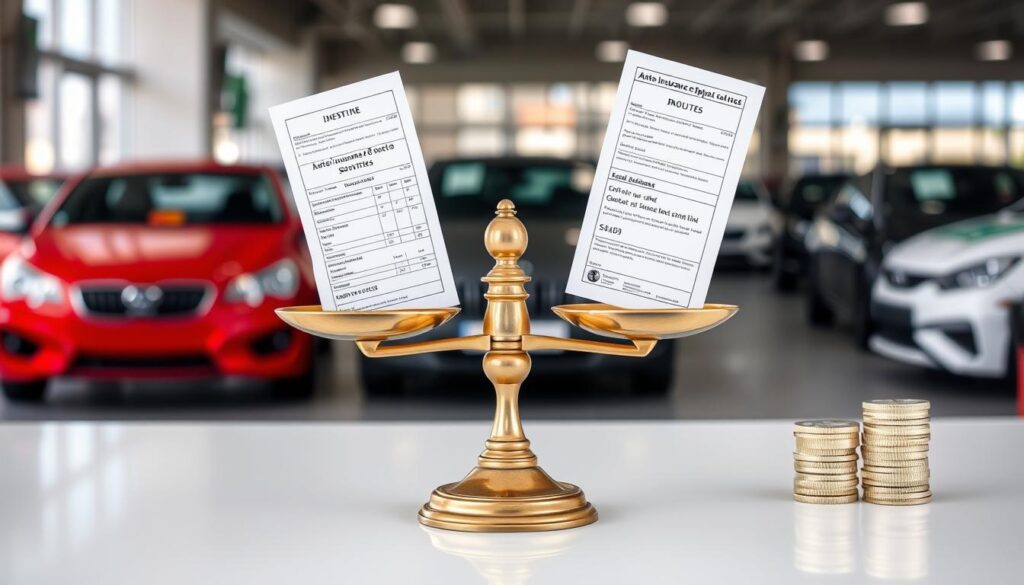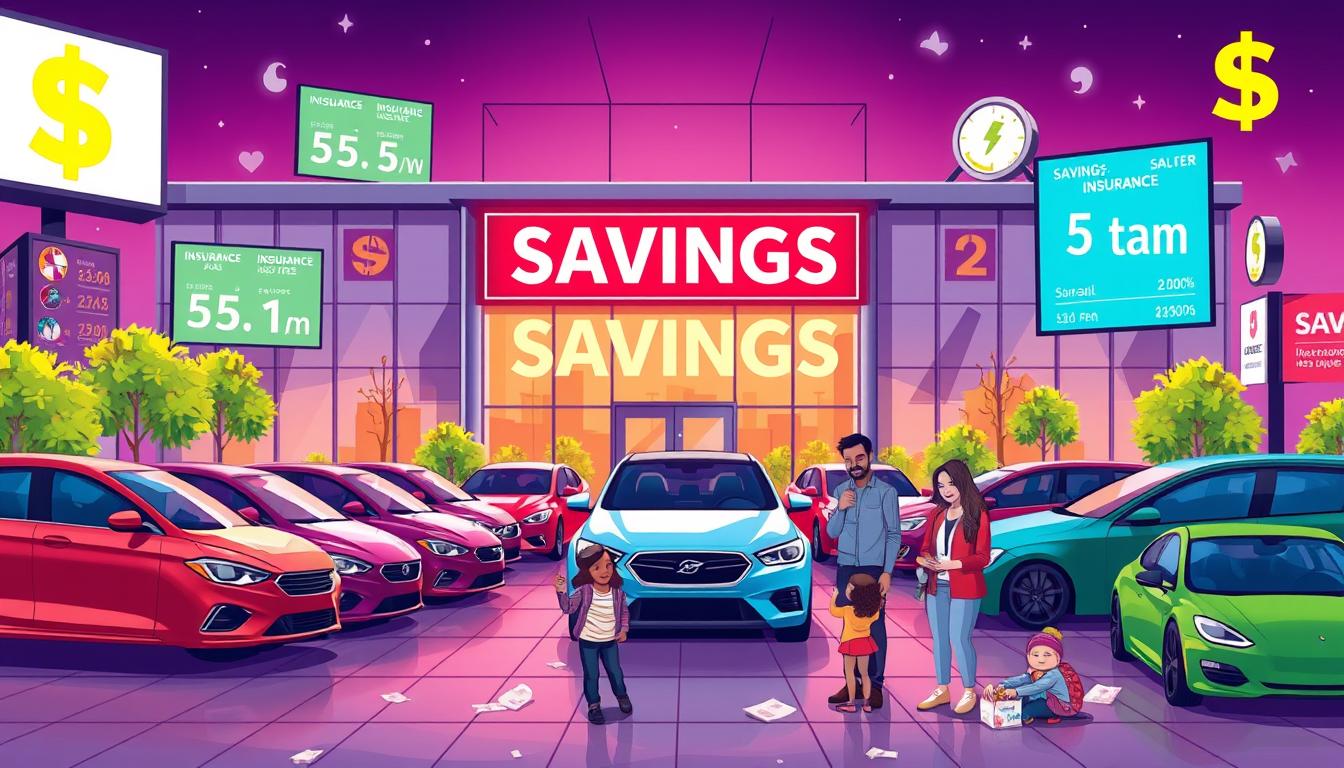Did you know that nearly 1 in 7 drivers in the United States are uninsured? This alarming figure highlights the critical need for reliable auto insurance. It serves as a safeguard for personal peace of mind and financial security. As the demand for affordable car insurance rates escalates, securing cheap auto insurance quotes becomes paramount. By employing effective strategies, you can obtain low-cost auto coverage that aligns with your budget and meets your unique requirements.
In this article, we will navigate you through the process of obtaining cheap auto insurance quotes. We will focus on methods to significantly reduce your premiums while ensuring adequate coverage. Whether you are a first-time buyer or contemplating a switch, grasping the nuances of auto insurance can yield substantial savings and enhanced protection for you and your vehicle. For further insights on car accidents and their impact on insurance, visit this resource.
Key Takeaways
- Exploring various quotes is crucial for financially smart choices.
- Understanding coverage types can lead to better policy decisions.
- Using online tools can simplify comparison shopping.
- Improving your credit score may help reduce your premiums.
- Discount opportunities are often available if you know where to look.
- Timely reviews of your policy can unlock additional savings.
Understanding Auto Insurance: Basics You Need to Know
Auto insurance is a critical component for vehicle owners, offering both legal and financial safeguards. It is pivotal to comprehend the foundational aspects of car insurance, encompassing the definitions of various policies and the significance of diverse coverage types.
What is Auto Insurance?
Auto insurance represents a contractual agreement between the policyholder and an insurance provider. It serves as a financial shield against accidents, theft, or vehicle damage. The policy delineates the scope of coverage, including repairs, medical costs, and legal expenses arising from accidents. A thorough understanding of auto insurance fundamentals can significantly enhance your driving experience.
Importance of Auto Insurance
Auto insurance is not merely a recommendation; it is often mandated by law in numerous jurisdictions. It acts as a bulwark against financial devastation in the aftermath of accidents, safeguarding personal assets and financial well-being. Additionally, it offers protection for damages incurred by others, ensuring adherence to state regulations.
Types of Auto Insurance Coverage
Grasping the various coverage options available is essential for selecting an appropriate policy. The primary categories include:
- Liability Coverage: This encompasses damages or injuries inflicted on others during an accident.
- Collision Coverage: It compensates for damages to your vehicle resulting from an accident.
- Comprehensive Coverage: This safeguards against non-collision-related incidents, such as theft or natural disasters.
- Personal Injury Protection (PIP): It covers medical expenses for you and your passengers following an accident, irrespective of fault.
Comprehending these coverage types is instrumental in selecting a policy that aligns with your needs and secures your financial future.
How to Get Cheap Auto Insurance Quotes
Securing affordable auto insurance quotes is paramount for drivers aiming to reduce expenses without compromising on coverage. Several strategies can facilitate this quest. Online comparisons emerge as the most expedient approach for consumers.
Start with Online Comparisons
Utilizing online platforms enables swift comparison of insurance rates across multiple providers. By inputting your details on various websites, you can collect a plethora of quotes for evaluation. Many individuals discover that online tools expedite the search for optimal rates. A thorough comparison aids in identifying the insurers offering the most competitive pricing and comprehensive coverage.
Contact Local Agents
Engaging with local auto insurance agents adds a personalized dimension to the insurance search. These agents possess local market insights that online tools might miss. Through discussions of your specific needs, they can craft tailored quotes, potentially leading to superior pricing or coverage.
Utilize Insurance Marketplaces
Insurance marketplaces serve as invaluable resources, enabling consumers to compare multiple insurers simultaneously. Platforms like NerdWallet streamline the process of obtaining and evaluating quotes. They offer a variety of options tailored to different budgets and needs, facilitating the discovery of the most cost-effective auto insurance for your situation.
Factors That Affect Your Auto Insurance Rates
Grasping the intricacies of auto insurance rates is paramount for every motorist. A myriad of elements intertwine to determine the premiums individuals incur. Key considerations include driving history, vehicle type, and credit scores.
Your Driving History
Your driving record is pivotal in shaping your premiums. Insurers scrutinize your driving history impact, examining various aspects such as:
- Traffic violations
- Accidents or claims
- Experience as a driver
A pristine driving record typically translates to lower premiums. Conversely, a history replete with claims can significantly elevate insurance costs.
Type of Vehicle
The type of vehicle you own profoundly influences your rates. Insurers evaluate vehicle type considerations through several lenses, including:
- Safety ratings
- Repair and replacement costs
- Vehicle age and make
Generally, vehicles boasting superior safety ratings and lower repair costs are associated with more favorable insurance premiums.
Credit Score Impact
Your credit history is a critical determinant of auto insurance rates. Studies affirm that a higher credit score can result in lower premiums. Insurers perceive a robust credit profile as indicative of responsible behavior, thereby signaling lower risk. This relationship underscores the significance of maintaining good credit to potentially reduce insurance expenses.
Tips for Finding the Best Cheap Auto Insurance
Securing the most cost-effective auto insurance can appear daunting. However, employing certain strategies can ease this challenge. By leveraging available options and being proactive, you can substantially lower your insurance premiums.
Bundle Policies for Discounts
Exploring the possibility of bundling insurance policies, such as home and auto, is advisable. Many insurers provide discounts for customers who opt for combined coverage. This strategy not only reduces expenses but also simplifies your insurance management. Bundling can often result in superior coverage at a more economical rate.
Ask About Discounts
It is crucial to inquire about potential discounts your provider might offer. Insurers frequently have a variety of discounts available, including those for safe driving, low mileage, or completion of defensive driving courses. By posing specific inquiries, you can uncover savings that might otherwise remain undiscovered.
Adjust Your Coverage Options
Analyze your coverage options to strike a balance between cost and protection. Reducing coverage limits or adjusting deductibles can lead to considerable premium savings. It is essential to ensure that the chosen level of protection aligns with your comfort while aiming for the most affordable insurance.
When to Shop for Auto Insurance Quotes
Grasping the optimal timing for insurance quotes can profoundly influence your financial savings and the quality of your coverage. Recognizing when to commence the search for auto insurance is paramount for making well-informed decisions. Certain scenarios necessitate your immediate attention and proactive measures to guarantee the most advantageous coverage at the most competitive rates.
Key Times to Request Quotes
Several pivotal moments emerge as prime opportunities for requesting quotes. Consider the following:
- Policy Renewal: Approximately 30 days before your policy expires, assess other options to ensure you’re getting the best deal.
- Major Life Events: Changes in your life, such as marriage, moving to a new location, or welcoming a new driver into your household, can impact your insurance needs.
- New Vehicle Purchase: Acquiring a new car necessitates a review of your current insurance and may lead you to seek better offers.
Annual Policy Review
Engaging in an annual insurance review is a crucial step in maintaining the financial efficacy of your auto insurance. This practice enables you to reassess your coverage requirements, compare rates, and identify potential savings. During your annual insurance review, explore various insurers to discover the most fitting policy for your current circumstances. Regularly shopping for auto insurance ensures you continue to benefit from favorable rates and adequate protection.
For more tips on enhancing your claims experience, visit this resource.
Common Misconceptions About Auto Insurance
Exploring the realm of auto insurance often uncovers numerous misconceptions about auto insurance. Many individuals succumb to cheap insurance myths, mistakenly believing that lower premiums equate to superior value. Grasping the complexities of insurance policies is crucial to sidestep expensive errors and guarantee sufficient protection.
Cheaper Isn’t Always Better
The notion that lower-cost policies are inherently superior is a widespread fallacy. While cost-effectiveness is paramount, it should not compromise on vital coverage. Many economical insurance plans omit essential safeguards, leaving drivers exposed in the event of an accident. It is imperative for consumers to evaluate their coverage needs and balance premium costs against the protection they offer.
All Policies Are Not the Same
Another pervasive misconception is that all auto insurance policies offer identical coverage. This assertion is incorrect. Policies vary significantly in their coverage scope and claim handling. Neglecting to delve into policy specifics can result in coverage gaps that could be disastrous. Therefore, it is essential to dedicate time to understanding insurance policies to make well-informed decisions.
Understanding Premiums and Deductibles
The interplay between auto insurance premiums and deductibles is crucial for making informed decisions about your coverage. These elements directly influence your insurance costs and the financial burden during a claim. A detailed exploration of these concepts is necessary for a comprehensive understanding.
What is a Premium?
A premium is the periodic payment for your auto insurance policy, often due monthly or annually. Insurance companies assess premiums based on risk factors such as your driving history, location, vehicle type, and credit score. Recognizing that higher risk profiles correlate with increased premiums is fundamental.
How Deductibles Affect Your Costs
Deductibles are the upfront costs you agree to cover before your insurance takes over. Opting for a higher deductible can reduce your monthly premiums but may elevate your out-of-pocket expenses during a claim. The deductible’s role in shaping your insurance costs is paramount in policy selection. For instance:
- With a $500 deductible and a $2,000 claim, you pay $500, and the insurer covers $1,500.
- Choosing a $1,000 deductible could lower your premiums but increase your claim costs.
Grasping the dynamics between premiums and deductibles empowers you to make strategic choices in your auto insurance. For a deeper dive into deductibles, refer to this resource.
The Role of Credit Scores in Auto Insurance Rates
Grasping the nexus between credit scores and auto insurance premiums is paramount for those seeking to diminish their financial outlay. Insurers leverage credit scores as a proxy for risk, positing that individuals with superior credit scores are more likely to exhibit responsible driving behaviors. This underscores the significance of credit scores in determining insurance rates, underscoring the imperative for consumers to comprehend this relationship.
Why Insurers Use Credit Scores
Insurers deem credit scores a pivotal factor due to their association with claim propensity. Empirical analyses frequently reveal a correlation between suboptimal credit and increased accident likelihood. Therefore, enhancing credit scores can substantially lower monthly premiums, a strategy beneficial for drivers intent on reducing their financial burden. Moreover, grasping the underlying factors influencing insurance credit can empower policyholders to proactively manage their financial well-being.
Ways to Improve Your Credit Score
Enhancing your credit score can yield substantial savings on auto insurance premiums. Implement the following strategies:
- Ensure timely bill payments to foster a positive payment history.
- Reduce outstanding debt to diminish credit utilization ratios.
- Regularly review your credit report for inaccuracies and rectify them expeditiously.
- Limit new credit applications to circumvent unnecessary hard inquiries.
The Importance of Comparing Quotes

In the quest for optimal auto insurance rates, comparing auto insurance quotes emerges as a pivotal step. Many individuals fail to recognize the substantial financial benefits stemming from thorough comparisons across different insurers. By meticulously examining both coverage options and their associated costs, one can make decisions that lead to superior policy terms.
Assessing Coverage and Costs
A thorough coverage assessment transcends mere premium scrutiny. It necessitates a detailed examination of what each policy entails. Key considerations include:
- Types of coverage included
- Exclusions and limitations
- Deductible amounts
Grasping these elements ensures a focus on both cost-effectiveness and the quality and sufficiency of coverage.
Benefits of Multiple Quotes
Securing multiple quotes unveils a plethora of benefits of insurance comparison. It not only facilitates price negotiations but also uncovers superior coverage options that might be overlooked. The advantages are manifold:
- Identifying competitive rates
- Discovering unique policy features
- Enhancing overall financial protection
By engaging in this practice, one significantly increases the likelihood of securing a policy that perfectly aligns with their requirements. For further guidance on navigating the intricate world of insurance, refer to this resourceful link.
Additional Coverage Options to Consider
When assessing your auto insurance policy, it’s imperative to delve into additional coverage options that enhance your financial security. Gap insurance and uninsured motorist coverage are two critical areas to explore. These options can significantly bolster your protection, aligning with your unique needs and circumstances.
Gap Insurance Explained
Gap insurance acts as a vital safeguard for vehicle owners, especially those with outstanding auto loans exceeding the vehicle’s current market value. It fills the financial gap in the event of a total loss, ensuring that the remaining loan balance is covered. Without this coverage, drivers may face financial hardship, left to bear the responsibility of loan payments on a vehicle they no longer possess.
Uninsured Motorist Protection
Uninsured motorist coverage is a cornerstone of additional auto insurance, safeguarding you against accidents involving uninsured or underinsured drivers. This coverage is indispensable, providing financial support for medical costs, lost wages, and damages resulting from such incidents. By incorporating this into your policy, you fortify your resilience against the unforeseen consequences of a collision with an uninsured motorist, facilitating a smoother recovery process.
How to Save Money on Auto Insurance
Exploring avenues to diminish your premium can yield considerable financial benefits. A plethora of strategies exist, emphasizing the importance of safe driving and customized coverage. Below, we delve into two efficacious methods that numerous drivers can leverage.
Safe Driving Discounts
Insurance entities frequently incentivize drivers who exhibit prudent on-road conduct. By capitalizing on safe driving discounts, you can substantially curtail your insurance expenditures. Here are a few avenues to qualify:
- Maintain a pristine driving record devoid of accidents or infractions.
- Enroll in defensive driving courses acknowledged by insurers.
- Engage in telematics programs that monitor your driving habits, offering feedback and potential discounts.
Pay-Per-Mile Insurance Benefits
For individuals with limited driving, pay-per-mile insurance presents a compelling cost-saving opportunity. This policy structure levies charges based on mileage, thereby only requiring payment for actual usage. The benefits are manifold:
- Cost-effective for those who predominantly utilize public transportation or work remotely.
- Encourages mindful driving practices, enhancing overall road safety.
- Potential for lower expenses compared to conventional auto insurance rates.
What to Do If You’re Denied Coverage

Receiving a notice of denied auto insurance coverage can be incredibly frustrating. Understanding insurance denial begins with knowing the common reasons for rejection. These often include issues like incomplete applications or eligibility requirements. By identifying these factors, you can better navigate the process following a denial.
Understand the Denial Reasons
It’s essential to clarify why your auto insurance coverage was denied. Common explanations for this situation include:
- Incomplete or inaccurate application forms
- Previous claims history affecting eligibility
- Too many traffic violations or accidents
Taking the time to understand these factors can provide insights into your next steps.
Steps to Take After a Denial
After receiving a denial, consider the following steps after coverage denial:
- Review the denial letter. This document usually outlines specific reasoning, which helps in addressing the issue.
- Contact your insurance provider. Engaging in a conversation may reveal more information and clarify the situation.
- Appeal the decision. If you believe the denial was in error, initiating an appeal can bring a review of your application.
- Explore alternative insurance options. If the appeal doesn’t succeed, researching different insurers may lead to better chances of acceptance.
- Use resources for guidance. Websites like trouble getting coverage provide valuable assistance for those facing difficulties.
Following these steps can empower you to effectively manage the situation. Understanding denial reasons and taking proactive measures pave the way for future success in obtaining coverage.
Conclusion: Save Money with Informed Choices
Making informed insurance choices is crucial for securing affordable auto coverage. This article has underscored the importance of comparing quotes, understanding coverage options, and leveraging discounts. Your driving history and credit score significantly influence your premiums. Addressing these factors can enhance your savings potential.
Recap of Key Points
Various strategies for securing cheap auto insurance quotes have been discussed. From online comparisons to contacting local agents, these methods are pivotal. Understanding your premiums and deductibles is also key to reducing costs. A summary of savings strategies highlights the need for regular policy reviews and seeking new offers when circumstances change.
Next Steps for Affordable Coverage
To further enhance your approach to affordable coverage, adopt a proactive mindset. Regularly compare insurance options and don’t hesitate to request quotes. For instance, how often you should shop for new car insurance is a critical consideration. By staying informed and utilizing all available resources, you are more likely to find substantial savings on your auto insurance policy.
